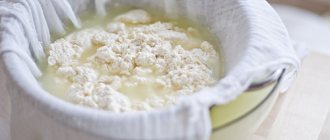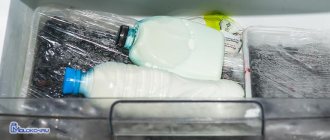Home / Products / Eggs and dairy products / Kefir
Kefir is considered one of the healthiest fermented milk products. The product contains a large number of biologically active substances (fungi and bacteria), which are responsible for the fermentation of milk, and therefore the shelf life of kefir is very short, and its storage conditions are quite strict. Storage features are directly related to production technology, which takes into account the conditions for preserving taste and beneficial qualities.
This product has three degrees of maturity. Different degrees of kefir affect the body differently. Weak kefir can act as a laxative, but strong kefir, on the contrary, can strengthen it. Kefir is divided into one-day (weak), two-day (medium) and three-day (strong). Weakness and strength can be determined by the accumulation of carbon dioxide and alcohol in kefir as the product matures.
Useful properties of kefir
Kefir is a very useful product for human health. It has a unique ability to positively influence intestinal microflora. Kefir helps to cope with many intestinal infections, normalize microflora during dysbacteriosis, and also improve intestinal function. This product will also be useful for problems with the immune system and chronic fatigue. Indeed, in addition to bacteria and fungi, kefir contains useful amino acids and vitamins. This fermented milk product is useful not only for adults, but also for children.
Its presence in the diet helps restore the balance of the body due to the presence of a number of microelements and vitamins. 100 g of product contains 59 kcal, as well as:
- carbohydrates - 4 g;
- proteins - 2.9 g;
- fat - 3.2 g.
The drink is recommended to be consumed at night in order to achieve normal metabolism in the body. It is recommended to use:
- to restore intestinal microflora;
- for diseases of the biliary tract;
- to restore the body's functioning after operations;
- as part of the diet.
The benefits of kefir also depend on the fat content. Fat content 3.2 allows you to combine, in addition to organic acids, fats, proteins and carbohydrates, also vitamins: beta-carotene, PP, B1, A, B2 and vitamin C, famous for its antioxidant effect.
In addition to fat content, kefir is also divided according to consistency. “Thick” and “liquid” kefir may be practically the same in chemical composition, but they will have differences in preparation technology. To obtain a “thick” drink, fermentation occurs directly in bottles, and to obtain a more liquid one, the product is fermented in special containers, and only then it is bottled.
Storage in open containers
- The shelf life of kefir depends on the conditions in which it is located and the degree of sealing of the packaging.
- From the moment the package is opened (its type does not matter), kefir can only be stored for 24 hours. After this time, the product will begin to actively sour and lose most of its beneficial properties.
- The drink, which is in an open package, must be consumed within 36 hours. This is the maximum period after which it is better to dispose of the remains.
- A fermented milk drink left on the table will turn sour over the next 4 to 6 hours.
Composition of kefir
The composition of “Ideal kefir” includes only pasteurized milk and a starter of living bacteria.
Kefir may contain yeast and bifidobacteria. But in this case, kefir will already be called “biokefir”. This product is especially useful for the gastrointestinal tract. In addition, biokefir is recommended for people to use during the postoperative period, and also, it does not contain allergens and therefore can be consumed by people with an allergic reaction to dairy products.
Various fruit additives in kefir do not bring anything good or useful, since the role of fruit additives is played by various preservatives and dyes. And such a chemical additive negates all the benefits of the product. In fact, it will no longer be kefir, but a kefir drink.
How to understand that kefir is spoiled
When a fermented milk product spoils, you can notice characteristic signs:
- Uneven yellow tint and strong sour odor
- Bitter or too sour taste
- Too obvious clots and whey separation
- Bloated packaging, which indicates unfavorable processes and the presence of air inside
Storing kefir at room temperature
If possible, it is better to avoid storing fermented milk products outside the cold, because this way it will quickly lose its beneficial properties and become unfit for consumption. But, if there is no other way out, you need to try to create the most favorable conditions. The product should receive a minimum of light, and it is better to put it in cold water. In this way, you can store kefir for no more than 6 hours.
Shelf life of kefir
The shelf life of kefir is limited and will depend on the characteristics of the starter used for its preparation. The product is perishable, but the use of specially bred microorganisms makes it possible to artificially extend the shelf life.
Kefir can be stored in sealed original packaging for up to 7 days. After opening the package, the product can be stored for up to 2 days.
The natural product has a white color, uniform consistency and a limited shelf life. Before buying kefir, you need to carefully study the information on the packaging: about the composition of the product and the timing of its production.
Cold storage is required to store the product. Kefir quickly sours at room temperature. At what temperature to store and for how long - this depends on the material from which the container is made. Properties are best preserved in cardboard packaging.
A glass bottle is more likely to retain beneficial bacteria, but this option comes at a high cost. When purchasing a drink in soft containers, you need to pay attention to swelling, which indicates spoilage of the product.
This is important to know:
Storing and using kefir that has expired is strictly prohibited .
An open drink in the refrigerator loses its beneficial properties very quickly and is not recommended for consumption without heat treatment. From such a “suspicious” product you can prepare several well-known dishes: pancakes, omelet, casserole.
The shelf life of opened kefir in the refrigerator is up to 2 days, and at room temperature – no more than 6 hours. It is also important to know that fresh product has a laxative effect on the intestines, and 4-day-old kefir has strengthening properties.
Shelf life according to GOST depending on the container
How long open kefir is stored in the refrigerator and closed in a sealed package is regulated by GOST 529032-2003. The instructions are advisory in nature, the deadline is determined directly by the manufacturer. However, if it is more than ten days from the date of manufacture, then it is no longer kefir, but a kefir product containing preservatives.
The shelf life is influenced by:
- package;
- compound;
- packaging tightness;
- storage temperature (ideally 0ºС).
In a closed package
The shelf life of kefir in a closed container, for example, a bag, is indicated directly on it. However, only “live” kefir can retain its beneficial properties, the shelf life of which depends on the packaging in which it is poured.
If the required temperature is not maintained in the refrigerator, the storage time is significantly reduced. According to legally established rules, the shelf life in hours is:
- kefir in polymer containers – 72;
- in glass bottles – 36;
- in cardboard bags – 24.
The manufacturer may deviate from these rules, for example, “Agusha” kefir for children is good for 8 days, as it contains reconstituted milk, which is stored longer than usual. Kefir made at home using a starter culture can be stored from one to three days (the fermentation temperature is affected).
How to choose quality kefir
What you should pay attention to when choosing this fermented milk product.
- When purchasing kefir, it is better to choose those types that are packaged in containers made of glass or cardboard, since these are the materials that help maintain optimal storage conditions for the product;
- It is important to pay attention to the manufacturing date of the product. If kefir has been in the store for more than 2-3 days, you should not buy it.
- Carefully check the shelf life of the product. Choose a product whose shelf life does not exceed a week. Such kefir will certainly be natural and without preservatives.
- Be sure to check the composition of the fermented milk product. According to GOST “Kefir. Technical specifications" kefir is made from kefir starter and milk raw materials:
- – from whole milk;
- – normalized milk;
- – skim milk;
- – reconstituted milk;
- – their mixtures.
How long can you keep in an airtight and open container?
In order for a fermented milk product to be suitable for consumption, its storage conditions must be observed.
In a refrigerator
At home, kefir should be stored in the refrigerator, preferably on the top shelf . If the package is closed, it should be consumed within a maximum of seven days, and after opening, within two days.
At room temperature
The fermented milk product can be stored at room temperature, avoiding exposure to sunlight, but not for long. After all, the conditions of its storage are violated, as a result of which it oxidizes and ferments faster. Therefore, at a temperature no higher than ten degrees, it can be stored for no more than four to six hours.
After the specified time has passed, you can no longer eat such fermented milk product.
Milk is one of the most popular products. It is not only drunk just like that, but also added to coffee or tea, used for dough and confectionery. On our website you will find information about the proper storage and shelf life of dairy and fermented milk products, including fresh and powdered milk, yogurt, butter, condensed milk, ice cream, sour cream, and cottage cheese.
Characteristics of kefir according to GOST
Organoleptic characteristics of the product
| Indicator name | Characteristic |
| Taste and smell | Pure fermented milk, without foreign tastes and odors. The taste is slightly spicy, yeast flavor is allowed |
| Color | Milky white, uniform throughout the mass |
| Consistency and appearance | Homogeneous, with a broken or unbroken clot. Gas formation caused by the action of microflora of kefir grains is allowed |
20 Nov 2020 Guardian 2977
- Related Posts
- Butter
- Chicken eggs
- Shelf life of butter according to GOST
- Storing cottage cheese in the refrigerator
How to store kefir in the refrigerator
The optimal storage temperature for kefir is -2 + 3, and since the average temperature in the refrigerator is +5, this product should be kept on the top or bottom shelves, depending on the design of the refrigerator, in the zone with the lowest temperature. If kefir is produced with special preservatives, it can be stored in the refrigerator for up to 10 days. You need to know that if fresh kefir, up to 2 days old, weakens the stomach, then after 3-4 days of storage it begins to strengthen. The longer a product sits even in the refrigerator, the more acid and alcohol fractions it contains.
Kefir can be stored in the freezer for no more than one and a half to two weeks, but it is simply no longer suitable for consumption. You can make homemade cottage cheese, cheesecakes or casserole from frozen kefir, but do not use it directly after complete defrosting.
If kefir has expired
If kefir has been in your refrigerator for more than one day, do not throw it away immediately. Even kefir that has expired can be used in food as an ingredient for a recipe. Using this kefir, you can make pancakes, pancakes, semolina, cookies and even cake. To prepare baked goods from kefir, you can use the product, no more than 7 days have passed from the date of production. Kefir that has been in the refrigerator for several weeks can easily cause poisoning.
If a bottle of kefir is already opened, then it should last no more than a day in the refrigerator.










